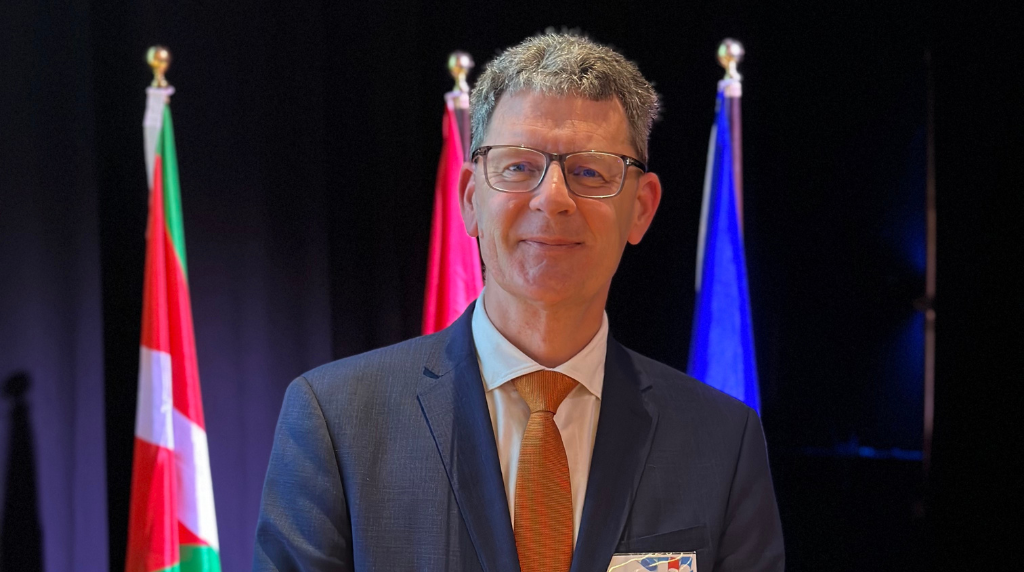Alberto Pereira: ‘Stakeholder mapping is key’ in ERNs
October 2023
Amidst the discussions at the Conference on Rare Diseases and the European Reference Networks in Bilbao, we had the privilege of sitting down with Alberto Pereira, the Coordinator of the European Reference Network for Rare Endocrine Conditions (Endo-ERN).
Alberto, who also serves as the Head of the Department of Endocrinology and Metabolism at Amsterdam University Medical Center has long been deeply engaged in the realm of rare diseases.
We explore with Alberto his proudest achievements within Endo-ERN, the distinct features of this network, and his vision for broadening the impact of European Reference Networks (ERNs).
As the Endo-ERN Coordinator, what’s the achievement you are most proud of, and why?
I’m most proud of the structure that we have within our network, which is a network that covers the expertise from birth to senescence. We have both a paediatric expert chair and an adult chair, and an EPAG co-chair.
Patient representation is ensured throughout all layers of the network, and, in all of the activities, patient representation is ensured.
This holds true for the educational activities, for the guideline developments, and also for the newly developed research projects.
Do you think this structure is shared by all ERNs?
I don’t think so. I’m pretty sure that it’s not the case, at least not throughout all layers, though one must not be so arrogant to think that this is certain. Nevertheless, our structure is a very distinct feature of Endo-ERN.
We have paediatric and adult expertise, ensuring the translation of the patient experience and have patient involvement in all the core activities.
How have the members of Endo-ERN leveraged their own networks? Do you think more can be done in this regard?
Ideally, there is an optimal translation of the European expertise and the European activities towards the national level and to the regional level and to the level of the general practitioners. But this is not the case, because the organisation of healthcare is very different amongst the different Member States. That’s why we now have this JARDIN project to implement a few important initiatives to facilitate this.
This is not the current situation. So, from Endo-ERN representation, we try to leverage this by liaising with national rare disease networks that are under development in many of the Member States, and to standardise the dissemination outreach of our own activities, including to the GP level. By ensuring patient representation in this respect, we hope to have maximal outreach.
As I said in my presentation, we now have a specific work package on dissemination and outreach, which is a big step for us, and for the rare disease world.
What’s your own recipe to ensure that patients from all EU countries benefit from the collective knowledge of the ERNs?
In addition to ensuring the participation of ePAGs in all the ERN activities, we also try to leverage the initial patient organisations that are not yet represented within Endo-ERN. Specifically for the Endo-ERN Academy and the webinar programme, all the ERN webinars are recorded and can be viewed at the discretion of the patient.
Do you think more could be done to increase the ERNs’ international collaboration with rare disease networks, experts and patient organisations from other global regions beyond Europe?
Having coordinated the European Rare Disease Research Coordination and Support Action consortium (ERICA) Project, I know it really helped to broaden the horizon, in the sense that if you want to initiate new activities, you need to have a framework in which all stakeholders that want to be involved are also invited. With these kinds of expert working groups that we had in ERICA; we were able to do so.
We had structural liaisons with the European Medicines Agency (EMA), with the National Institutes of Health (NIH), with the International Rare Diseases Research Consortium (IRDiRC), with patient representation, and with pharma companies. That is the most suitable structure, and it can be extrapolated for all other kinds of initiatives.
You can easily make a very broad advisory board, which embraces everyone who would like to be involved.
Advisory board representatives can make use of these expert working groups and any of the activities that we want. Stakeholder mapping is key to these projects.
Alberto Pereira is the Coordinator of the European Reference Network for Rare Endocrine Conditions (Endo-ERN). He also runs the European Rare Disease Research Coordination and Support Action in a part-time capacity. Residing in Amsterdam, his principal role is Head of the Department of Endocrinology and Metabolism at Amsterdam University Medical Center.
